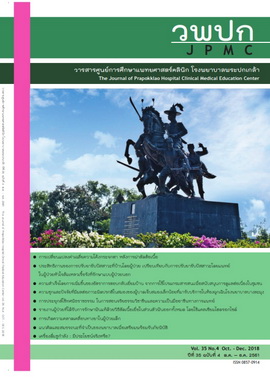Concepts and Essential Competencies of Nurses for Disaster Preparedness
Main Article Content
Abstract
At present, disaster is still increasing with dramatic impact. The impact of disaster can cause detrimentally side effect such as mortality and huge destruction. Therefore, the disaster preparedness and response are the major top concerned that have been discussed in many countries and also becoming more important issue on the international agenda. Nurse is the largest group of healthcare providers in Thai’s health system who play the crucial role in each stage when the disaster strikes. Therefore, the fundamental disaster competencies are important for nursing effective care delivery during the disaster situations. The International Council of Nurses (ICN) developed the ICN framework of Disaster Nursing Competencies in which consist of four main aspects; mitigation/prevention competencies, preparedness competencies, response competencies, and recovery/rehabilitation competencies. Nurses are the one that respond the importance role when the disaster beat. As the consequence, nurses should be promoted and prepared to obtain the qualification and ready for preparedness and response of the disaster which is achievement of the standard in both of nation and international level.
This literature interview exhaustively present the key concepts and the core competencies needed of disaster nursing. Additionally, it can be used as a guideline for initiating effective and systematic disaster nursing management, competency development and disaster nursing management skills.
Article Details
References
1. Department of Disaster Prevention and Mitigation, Ministry of Interior. Reduce disaster risk. Bangkok: Agricultural Cooperative Federation of Thailand; 2013.
2. Department of Mineral Resources. Tsunami [Internet].2005 [cited 2018 Jun 20]. Available from:https://www.dmr.go.th/download/tsunami_manual/005.pdf.
3. Siripul P, Sakdisthanont S. Disaster nursing: essential competencies for Thai nurses. Thai Journal of Nursing Council 2012; 27(Special Issue): 18-30.
4. ProVention Consortium. Hyogo framework for action [Internet]. 2007 [cited 2018 Jun 20]. Available from: https://www.unisdr.org/files/1217_HFAbrochureEnglish.pdf
5. The Nurses’ Association of Thailand. ICN framework of disaster nursing competencies. Bangkok: The Nurses’ Association of Thailand; 2014.
6. Cox E, Briggs S. Disaster nursing: new frontiers for critical care. Criti Care Nurse 2004; 24:16-22.
7. World Health Organization. Risk reduction emergency preparedness [Internet]. 2007 [cited 2018 Jun 10]. Available from: https://www.who.int/hac/techguidance/preparedness/emergency_preparedness_eng.pdf.
8. International Federation of Red Cross and Red Crescent Societies. Introduction to disaster preparedness [Internet]. 2000 [cited 2018 May 20]. Available from: https://www.ifrc.org/Global/Introdp.pdf.
9. International Council of Nurses. ICN creates disaster network. Int Nurs Rev 2007; 54: 213-5.
10. World Health Organization and International Council of Nurses. ICN framework of disaster
nursing competencies. Geneva: WHO/WPRO [Internet]. 2009 [cited 2018 May 10]. Available
from: https://www.wpro.who.int/hrh/documents/icn_framework.pdf
11. Gebbie KM, Qureshi K. Emergency and disaster preparedness: core competencies for nurses.
Am J Nurs 2002;102:46-51.
12. Lukthitikul S, Hatthakit U, Perawutt J. Experiences of nurses practising during the tsunami at hospitals of Phang-Nga province. Songkla Med J 2008; 26:349-60.
13. Chuengsatiansup K, Singha S, Netiparatanakul P, Suputtamongkol S. Community disaster
tools. Nonthaburi: Suksala Books; 2014.

